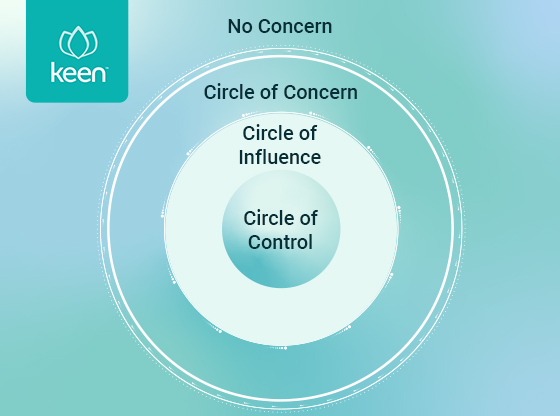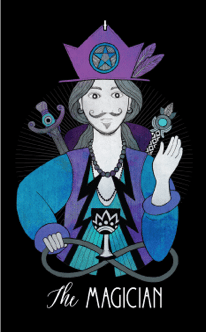You’re incredibly organized, never miss a deadline, your finances are perfectly in order, and you seem to get along with everyone. In fact, you seem to have a handle on just about everything in your life—until you don’t. When things happen outside of your control, it can feel as though your whole world has been turned upside down. That’s your Circle of Control at work. But what is that? And how can you manage your mindset and behavior? Well, keep reading.
What Is The Circle of Control?
The Circle of Control is one of three circles in a model used to frame thinking created by author, educator, and businessman Stephen Covey in his famous book The 7 Habits of Highly Effective People.
The other two circles are the Circle of Concern and the Circle of Influence.
Covey says proactive people focus on what they can do and reactive people waste their energy worrying about things beyond their control. The circle’s help you figure out how to be proactive.

The image above shows how the three circles fit.
The Circle of Control is centermost of the three. It includes all circumstances and problems you have direct control over. This includes behavior and thoughts. While you can’t always manage what you’re thinking, you can choose to change your mindset, which affects your reality.
The circle outside the Circle of Control is the Circle of Influence. It includes issues you have unintended control over, including problems involving the behavior of others. While you can’t control them, you can positively influence them based on your actions and decisions.
Lastly, the outside circle is the Circle of Concern—aka the circle of no control. These are issues and situations that you have no control over, including topics from the past. It’s the most extensive circle of the three because there are many things in life that we have no power to change.
The moral of the story is that if you should focus where you have control and influence. This is the best chance people have of making a good life for themselves and their communities.
How To Deal With Factors Outside of Your Circle of Control
Changing your mindset is easier said than done, but some techniques can help you manage your thoughts and emotions when dealing with things outside your circle of control. It’s vital to implement these techniques in your life to be healthy in mind, body, soul, and spirit. Identify Your Fears
Do you cringe at the thought of public speaking? Does the word travel immediately make you think of a disaster?
By identifying your worst fears and taking the time to think about them, you may either realize the worst-case scenario isn’t as bad as you thought or far-fetched. Even if something beyond your control does happen there’s a good chance you can bounce back and put your energy into more productive thinking.
Focus on What You Can Control
As mentioned, the Circle of Concern is the largest because there are countless things in life you have no control over. Even so, sometimes it’s easier to focus on the bad.
Try journaling. Before you start your day, jot down the things you know you have a complete handle on—working out, finishing a work assignment, meeting friends for a drink, preparing a healthy dinner, etc., then check the items off as you go. While this doesn’t include everything you’re concerned with, it will show you how much power you do have over the things you can control.
Be a Positive Influence
Influencing someone isn’t about control. It’s about being a role model. A good parent has a positive influence on their child.
You can positively impact anyone in your life, from a coworker to a friend to a stranger you meet in the line at the grocery store. But remember: only share as much of yourself as people are asking for. If someone chooses to act differently than how you’d like, that’s their choice.
Practice Mindfulness
Mindfulness comes in many forms, and there’s no right or wrong way to practice it. For some, it’s daily meditation, practicing yoga, taking a walk in nature, or journaling. Affirmations are also a great technique because they can help stop negative thoughts and feelings of self-doubt.
Seeking Support
Sometimes, one of the best ways to deal with factors outside of your control is by seeking support. Of course, friends, family, or a therapist can all be great people to talk to for help.
Talk To A Keen Advisor For Spiritual Support
Another excellent source to help you gain control over your feelings and emotions is a professional Keen advisor. Psychics can see into situations and problems in your life and provide practical guidance to help you get back on track. Whether you’re dealing with matters of the heart, career, or spirituality, our advisors are here for you 24/7.













